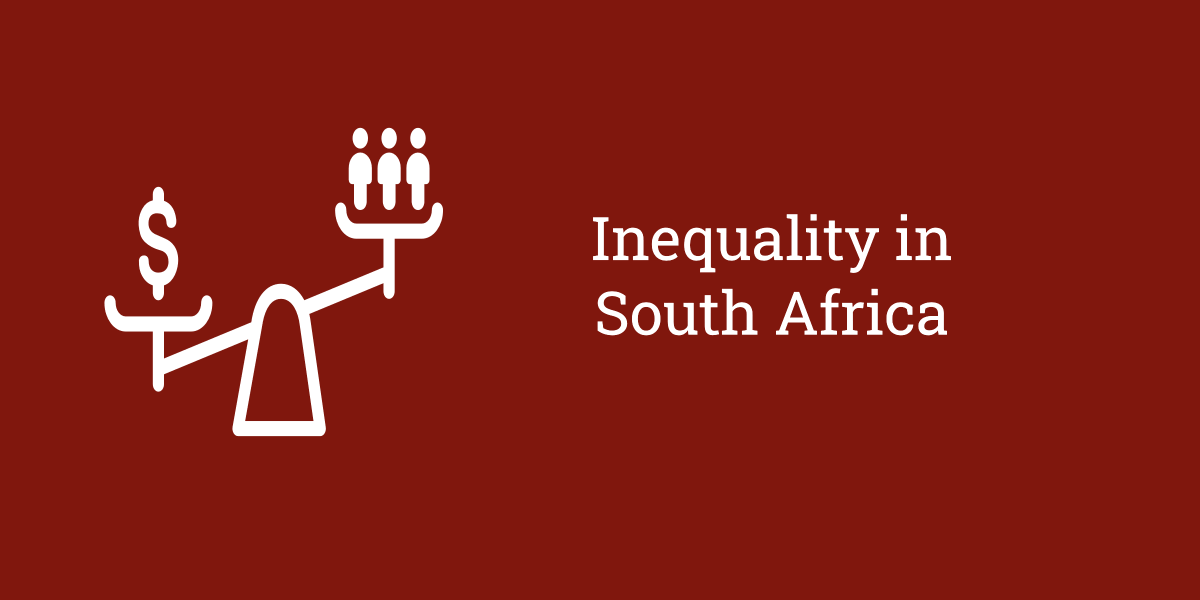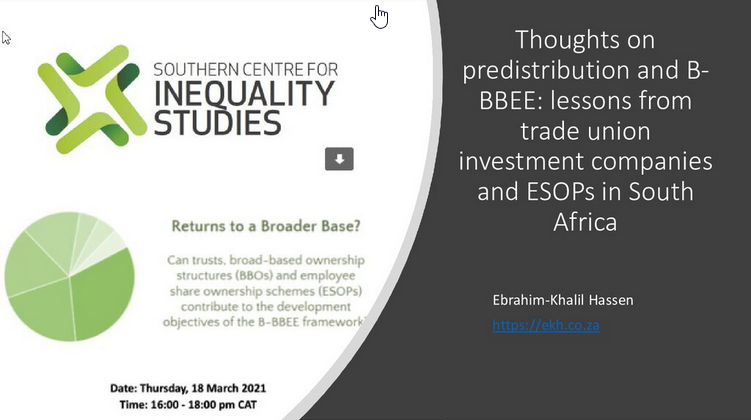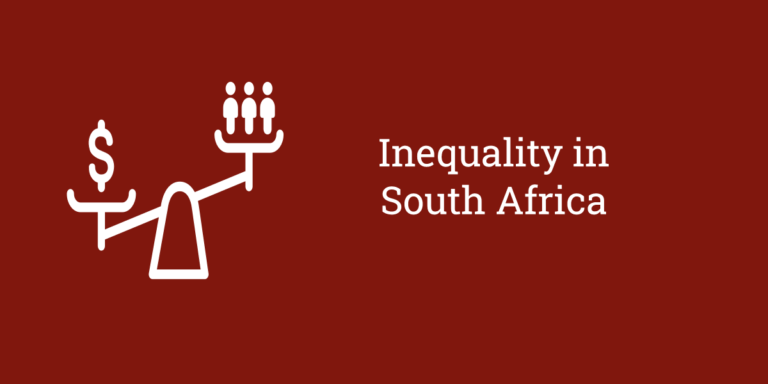Have we reached the end of the road for redistribution in South Africa? Recent publications by the World Bank and the South African Communist Party (SACP) suggest that the time for redistribution may well be over. The oddness of the pairing – usually with different ideological stances – is remarkable in itself, but the underlying logic for reaching the conclusion is even more remarkable.
The policy recommendation is similar. After a strong focus on expanding services, South Africa must now focus on the economy. The detailed proposals from the SACP differ from the standard set of recommendations from the World Bank, but the argument that we have reached the limits of redistribution in South Africa is a common thread. The solutions for the SACP is to be found in policies aimed at industrialisation and infrastructure development. For the World Bank’s part, there are no detailed proposals in its report, but a general call for inclusive economic growth and a warning that the fiscal limits have been reached.
There are, of course, important differences as well, but they share a remarkable circumvention: the failure to unpack how the poor, especially the young and unemployed, will be able to participate in the envisaged economic reforms.
The publication of the World Bank report, “South Africa Economic Update: Fiscal Policy and Redistribution in an Unequal Society”, provides an important analysis of the impact of government expenditure on the poor and for the first time, provides incidence reports on taxation, which shows that personal income tax is progressive. The study uses methodologies used in other countries, which allows for comparisons.
South Africa is an outlier. The impact of government spending on the poor in South Africa has the biggest impact on inequality when compared to other countries. But, we still remain the most unequal country compared to others in the sample.
The paradox of having a redistributive fiscal outcome with social grants having the biggest impact alongside very high levels of inequality is an important one. The World Bank uses this finding to argue that redistributive efforts via government spending are unlikely to lead to major changes in inequality. In other words, the bank is arguing that social grants reduce inequality, but play a limited role in economic growth. The evidence however shows that social grants play a role in supporting poorer people’s involvement in the economy.
Importantly, the World Bank combines good redistributive impacts with a warning that South Africa is required to “consolidate its fiscal position” and ultimately suggests that the answer lies in inclusive economic growth. But while saying so, the World Bank also pays scant attention to the highly concentrated nature of the South African economy, which is the major obstacle to inclusive economic growth.
The South African Communist Party (SACP) recently published a policy document titled: “Going to the Root: A Radical Second Phase of the National Democratic Revolution – Its Context, Content and Our Strategic Tasks”. The core distinction it makes is a division between the first and second phases of transformation. During the “first phase” it is argued that radical changes to political rights and redistributive efforts have resulted in major improvements in service delivery. However, it argues that despite these improvements in service delivery, inequality and unemployment remain extremely high.
To rectify this failure a “second phase” is needed. The SACP makes a call for “radical economic transformation”, which includes an attempt to grow the capitalist economy whilst also nurturing the solidarity economy. The “second phase” is about radical economic transformation with industrial policy and infrastructure development playing a foundational role in supporting structural change.
The starting points for the World Bank and the SACP may be different, but the underlying message is the same. South Africa needs to focus on the economy and the time and space for expanding redistribution is limited.
It is worth noting that this is not the first time that the World Bank and the SACP have been in agreement. The SACP also endorsed the World Bank inspired Growth, Employment and Redistribution (GEAR) plan. This is factually correct, but what is of broader interest is the fact that eighteen years later, the same argument, which brought these strange bedfellows together, is being repeated. Just as in 1994, the argument is that restructuring government finances combined with market-based reforms will lead to higher economic growth and greater social equity. The variables are obviously different, but the underlying logic is jarringly similar: (a) social spending has limited impact and (b) economic restructuring will stimulate growth and inclusion.
However, we know that the GEAR policy failed to deliver on the anticipated levels of economic growth and employment. It did not increase investment levels either. In fact, major increases to the social grant system only occurred after the GEAR period with supporters arguing that this was due to the fiscal space created by GEAR and critics arguing that it was due to GEAR’s failure to create employment.
Taken together and perhaps unwittingly the reports reduce the space for redistributive projects with the promise of greater equality depending on programmes to improve economic inclusion. In arguing this point, the core question of how poor people are supposed to share the benefits of economic reform remains unsatisfactorily answered.
Specifically, the relationship between the agency of the poor and the structure of the economy is glossed over. Unemployment data provides an important reminder of the interaction between structure and agency. Youth unemployment best illustrates this.
In South Africa, there are over three million unemployed young people who are not employed or in education and training. It’s not just that these young people merely have limited opportunities to enter their first job; they can be more accurately described as being structurally excluded. Importantly, they receive no social security support.
Government interventions to reduce youth unemployment exist and in several instances are producing encouraging results. However, scaling these programmes to have substantial impacts requires expanding government budgets. Moreover, as analysis undertaken by the Basic Income Grant Coalition indicates, expanding social security to this group in South Africa would provide a foundation on which programmes such as improved education, public works and entry into education and jobs are much more likely to succeed.
Expanding the social security system will require more public money and a radical reprioritisation of existing spending. The outcome of expanding social security would however result in greater participation in the economy through employment and potentially youth enterprises. A credible case for expanding the redistributive role of fiscal policy is thus made.
The SACP may repudiate this on the basis that its discussion document contains strategies to address youth unemployment. For instance, it argues for a continued and expanded role for public works as part of a strategy for “decommodification of work”. However, a much bolder strategy of government supporting the “right to work” through an expansion of the Community Works Programme (CWP) would have a more significant and lasting effect as opposed to simply increasing the existing Expanded Public Works Programme (EPWP). The shift from short-term work on public works under the EPWP, to regular work under the CWP offers greater prospects for improving the agency of the young and unemployed to enter the economy, and arguably also strengthens the non-state sector. Here again, the costs of scaling the CWP would be large, but affordable provided a significant reprioritisation of existing spending is undertaken.
Simply stated, without an effective and sustainable redistributive strategy – either through an expansion of social security or a reimagined public works programme – the likelihood of youth participating and benefiting from economic reforms is unlikely. It is the link between government usage of its resources to improve the prospect of people participating in the economy, and the restructuring of the economy that must be sustained. It harks back to the principle contained in the Reconstruction and Development Programme (RDP) to link development to growth.
Rapid structural change in the economy is obviously needed. Industrial policy and infrastructure development programmes are intended to do just that. However, even here the links between these programmes and more egalitarian wealth distribution are tenuous. Start-up and smaller businesses would be hard pressed to find direct support through the current suite of industrial policy schemes, and larger businesses will benefit more from the infrastructure plan. Here again, redistribution matters.
The redistribution of market-based opportunities for firms is a subject not discussed in our economic policies. However, across the globe procurement policies, taxation, competition policy, supplier development programmes and other instruments are more aggressively utilised by government to support the entry of smaller firms and their continuation. Here again, it requires a reprioritisation of spending and more importantly, a reorientation in policy.
The biggest challenge however remains that much of what is being proposed rests on South Africa rapidly improving its economic growth rate to at least 4,5% per annum, or more ambitiously to 7% over a sustained period. The likelihood of this occurring is extremely slim precisely due to low levels of economic participation. In a context where rapid economic growth will not be achieved, the role of government to strengthen economic participation is foundational. In particular, it requires us to develop policies that improve prospects for economic inclusion even under conditions of low economic growth.
The danger of the SACP and World Bank asking us to focus on economic transformation alone is not only that the possibility of a stronger redistributive stance recedes. Without linking redistributive instruments to economic strategies, South Africa will fail to provide the ways and means for excluded people and firms to craft strategies to participate in economic growth. The challenge is not simply more money, but rather better programmes and a radical reprioritisation of existing spending. Surely, the more people are enabled to participate in the economy the prospects for sustained economic transformation increase?
This article was first published under creative commons license on South African Civil Society Information Service website.


